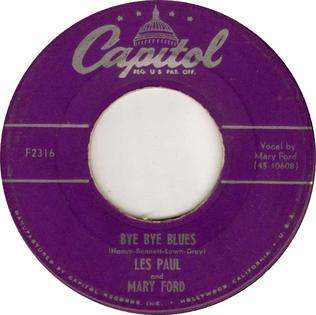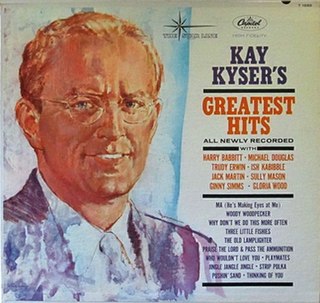
"Blueberry Hill" is a popular American song published in 1940 and first recorded and released by Sammy Kaye in 1940 on RCA Victor. It is best remembered for its 1950s rock and roll version by Fats Domino.
The Little Shoemaker" is a popular song based on the French song, "Le petit cordonnier", by Rudi Revil. The original French lyric was written by Francis Lemarque. The English language lyrics were written by Geoffrey Claremont Parsons, Nathan Korb and John Turner.
"On the Atchison, Topeka and the Santa Fe" is a popular song written by Harry Warren with lyrics by Johnny Mercer. The song was published in 1944, spanned the hit chart in mid-1945, and won the 1946 Academy Award for Best Original Song, the first win for Mercer.
"Again" is a popular song with music by Lionel Newman and words by Dorcas Cochran. It first appeared in the film Road House (1948), sung by Ida Lupino. An instrumental rendition was used in the movie Pickup on South Street (1953). By 1949, versions by Vic Damone, Doris Day, Tommy Dorsey, Gordon Jenkins, Vera Lynn, Art Mooney, and Mel Tormé all made the Billboard charts.

"That Old Black Magic" is a 1942 popular song written by Harold Arlen (music), with the lyrics by Johnny Mercer. They wrote it for the 1942 film Star Spangled Rhythm, when it was first sung by Johnny Johnston and danced by Vera Zorina. The song was nominated for the Academy Award for Best Original Song in 1943 but lost out to "You'll Never Know".
"Thinking of You" is a popular song, composed by Harry Ruby with lyrics by Bert Kalmar. It was introduced in the Broadway show, The Five O'Clock Girl (1927) when it was sung by Mary Eaton and Oscar Shaw.
"Nevertheless I'm in Love with You" is a popular song written by Harry Ruby with lyrics by Bert Kalmar, first published in 1931. The song was a hit for Jack Denny in 1931, and was revisited in 1950 by The Mills Brothers, Paul Weston, Ray Anthony, Ralph Flanagan, Frankie Laine and Frank Sinatra, with perhaps the most compelling version being that of the McGuire Sisters.
"I Dream of You (More Than You Dream I Do)" is a popular song.
"Imagination" is a popular song with music written by Jimmy Van Heusen and the lyrics by Johnny Burke. The song was first published in 1940. The two best-selling versions were recorded by the orchestras of Glenn Miller and Tommy Dorsey in 1940.
"Bell Bottom Trousers" is a reworking of the folksong "Rosemary Lane". A sea shanty version has bawdy lyrics, but a clean version of the tune was written in 1944 for modern audiences by bandleader Moe Jaffe.

"The Nearness of You" is a popular song written in 1937 by Hoagy Carmichael with lyrics by Ned Washington. Intended for an unproduced Paramount film titled Romance In The Rough, the studio's publishing division Famous Music reregistered and published the song in 1940. It was first recorded by Chick Bullock and his Orchestra on Vocalion. Despite numerous accounts to the contrary, the song was never scheduled for and does not appear in the 1938 Paramount film Romance in the Dark.
"Sunday, Monday or Always" is a 1943 popular song with music by Jimmy Van Heusen and lyrics by Johnny Burke.
"Cruising Down the River" is a 1946 popular recording song, which became the winner of a public songwriting competition held in the UK. Words and music were entered by two middle-aged women named Eily Beadell and Nell Tollerton. The words had been written by Eily in the 1920s, and the melody composed by music hall artist Ena Dayne; as she could not read music, it was transcribed by Tollerton. It was sung in concert parties throughout the 1930s, mainly by Charles Ray. One of the original early recordings of this song, issued in the UK in January 1946 on the Columbia record label, was by Lou Preager and his Orchestra, with vocals by Paul Rich. This was immensely popular on radio, with record and sheet music sales making it one of the biggest hits of 1946 in the United Kingdom.
"I Can't Begin to Tell You" is a popular song with music written by James V. Monaco and lyrics by Mack Gordon. The song was published in 1945.
"Managua, Nicaragua" is a popular American song from 1946, whose music was written by Irving Fields, and lyrics by Albert Gamse.
"Serenade of the Bells" is a popular song written by Kay Twomey, Al Goodhart, and Al Urbano and published in 1947.
"The Old Lamp-Lighter" is a popular song. The music was written by Nat Simon, the lyrics by Charles Tobias. The song was published in 1946.

"Bye Bye Blues" is an American popular and jazz standard written by Fred Hamm, Dave Bennett, Bert Lown, and Chauncey Gray and published in 1925.

Kay Kyser's Greatest Hits is a 1962 compilation album featuring music made famous by American bandleader Kay Kyser released by Capitol Records. While Kyser himself was not present at the recording session, former members of his orchestra Harry Babbitt, Mike Douglas, Trudy Erwin, Ish Kabibble, Jack Martin, Sully Mason, Ginny Simms, and Gloria Wood reunited to make re-recordings of their original Columbia Records hits.
"With the Wind and the Rain in Your Hair" is a song composed by Clara Edwards, with lyrics by Jack Lawrence. First published in 1930, it became a hit a decade later.




